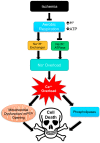Cyclic Nucleotide-Directed Protein Kinases in Cardiovascular Inflammation and Growth
- PMID: 29367584
- PMCID: PMC5872354
- DOI: 10.3390/jcdd5010006
Cyclic Nucleotide-Directed Protein Kinases in Cardiovascular Inflammation and Growth
Abstract
Cardiovascular disease (CVD), including myocardial infarction (MI) and peripheral or coronary artery disease (PAD, CAD), remains the number one killer of individuals in the United States and worldwide, accounting for nearly 18 million (>30%) global deaths annually. Despite considerable basic science and clinical investigation aimed at identifying key etiologic components of and potential therapeutic targets for CVD, the number of individuals afflicted with these dreaded diseases continues to rise. Of the many biochemical, molecular, and cellular elements and processes characterized to date that have potential to control foundational facets of CVD, the multifaceted cyclic nucleotide pathways continue to be of primary basic science and clinical interest. Cyclic adenosine monophosphate (cyclic AMP) and cyclic guanosine monophosphate (cyclic GMP) and their plethora of downstream protein kinase effectors serve ubiquitous roles not only in cardiovascular homeostasis but also in the pathogenesis of CVD. Already a major target for clinical pharmacotherapy for CVD as well as other pathologies, novel and potentially clinically appealing actions of cyclic nucleotides and their downstream targets are still being discovered. With this in mind, this review article focuses on our current state of knowledge of the cyclic nucleotide-driven serine (Ser)/threonine (Thr) protein kinases in CVD with particular emphasis on cyclic AMP-dependent protein kinase (PKA) and cyclic GMP-dependent protein kinase (PKG). Attention is given to the regulatory interactions of these kinases with inflammatory components including interleukin 6 signals, with G protein-coupled receptor and growth factor signals, and with growth and synthetic transcriptional platforms underlying CVD pathogenesis. This article concludes with a brief discussion of potential future directions and highlights the importance for continued basic science and clinical study of cyclic nucleotide-directed protein kinases as emerging and crucial controllers of cardiac and vascular disease pathologies.
Keywords: G protein-coupled receptor; Smad3; Stat3; cyclic nucleotide; inflammation; interleukin 6; myocardial infarction; protease-activated receptor; protein kinase; vascular smooth muscle.
Conflict of interest statement
The authors declare no conflicts of interest.
Figures







References
-
- Benjamin E.J., Blaha M.J., Chiuve S.E., Cushman M., Das S.R., Deo R., de Ferranti S.D., Floyd J., Fornage M., Gillespie C., et al. Heart disease and stroke statistics-2017 update: A report from the American Heart Association. Circulation. 2017;135:e146–e603. doi: 10.1161/CIR.0000000000000485. - DOI - PMC - PubMed
-
- World Health Organization Cardiovascular Diseases (CVDs) Fact Sheet. [(accessed on 18 December 2017)]; Available online: http://www.who.int/mediacentre/factsheets/fs317/en/
-
- Adderley S.P., Joshi C.N., Martin D.N., Mooney S., Tulis D.A. Multiple kinase involvement in the regulation of vascular growth. In: Xavier G.D.S., editor. Advances in Protein Kinases. InTech Open Access Publishers; Rijeka, Croatia: 2012. pp. 131–150.
Publication types
Grants and funding
LinkOut - more resources
Full Text Sources
Other Literature Sources
Miscellaneous

